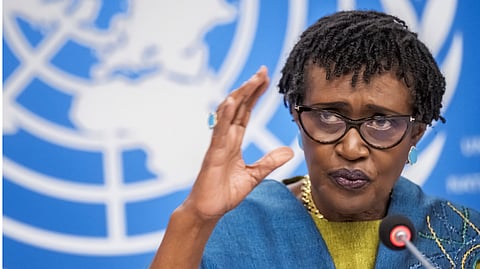

Launching its 2025 World AIDS Day report, Overcoming Disruption, Transforming the AIDS Response, UNAIDS has sounded an urgent alarm: international assistance for HIV programmes is sharply declining, with OECD estimates indicating that external health funding could drop by 30–40% in 2025 compared to 2023.
The consequences are already being felt across low- and middle-income countries, where HIV burden is highest. According to UNAIDS, the sudden contraction in support has exposed the extreme fragility of progress made over the past decades — affecting prevention, testing, and treatment across multiple regions.
Prevention Services Hit the Hardest
The report details widespread disruption across essential HIV services:
Decline in treatment initiation across 13 countries.
Stock-outs of HIV test kits and essential medicines in Ethiopia and the Democratic Republic of the Congo.
Sharp drops in preventive medicine distribution:
Uganda: –31%
Viet Nam: –21%
Burundi: –64%
450,000 women in sub-Saharan Africa losing access to “mother mentors,” crucial community workers linking pregnant women to care.
Nigeria reporting a 55% decline in condom distribution.
Adolescent girls and young women remain among the most vulnerable. Even before the funding crisis, 570 new infections occurred daily among young women aged 15–24. The erosion of prevention programmes is expected to intensify these risks.
Community-led organisations — often the backbone of last-mile HIV services — are increasingly constrained, with more than 60% of women-led groups having to suspend essential outreach.
UNAIDS modelling shows that failure to restore prevention efforts could result in an additional 3.3 million HIV infections from 2025 to 2030.
Human Rights Setbacks Amplifying Risks
The funding crisis is unfolding in parallel with a global rise in restrictive laws and shrinking civic space — particularly affecting populations most at risk of HIV.
For the first time since UNAIDS began tracking such issues, the number of countries criminalising same-sex relations and gender expression increased in 2025. Currently:
168 countries criminalise some aspect of sex work
152 countries criminalise small-scale drug possession
64 countries criminalise same-sex relations
14 countries criminalise transgender people
Restrictions on civil society — including tighter registration requirements and limitations on receiving international support — are further undermining service access.
Zimbabwe: Service Disruptions Underscore the Human Impact
In Zimbabwe, the consequences have been immediate. With international funding halting in January 2025, frontline providers were laid off overnight. Medicines remained available, but the workforce required to deliver them disappeared, fracturing both adherence and patient trust.
At the Centre for Sexual Health and HIV/AIDS Research (CeSHHAR), HIV testing case-finding rates have dropped by more than 50%, reflecting the collapse in accessibility rather than a reduction in need. Community teams are trying to bridge the gaps but remain significantly overstretched.
Two emerging areas of promise stand out:
Community resilience, which continues to sustain service continuity despite resource constraints
Long-acting prevention tools, including injectable lenacapavir — recently fast-tracked for approval in Zimbabwe and anticipated to become available nationally in early 2026
A Global Call to Action
UNAIDS urges governments and international partners to re-commit to the global HIV response by:
Reinforcing multilateralism and global solidarity, in line with commitments at the G20 Leaders Summit in South Africa
Maintaining and increasing HIV funding, with priority for countries most dependent on external support
Investing in innovation, especially scalable and affordable long-acting prevention technologies
Protecting human rights and strengthening community-led responses, which remain central to reaching those most at risk
At a pivotal moment for the global AIDS response, UNAIDS stresses that the decisions made now will determine whether decades of progress are protected — or reversed — in the years ahead.
Also Read